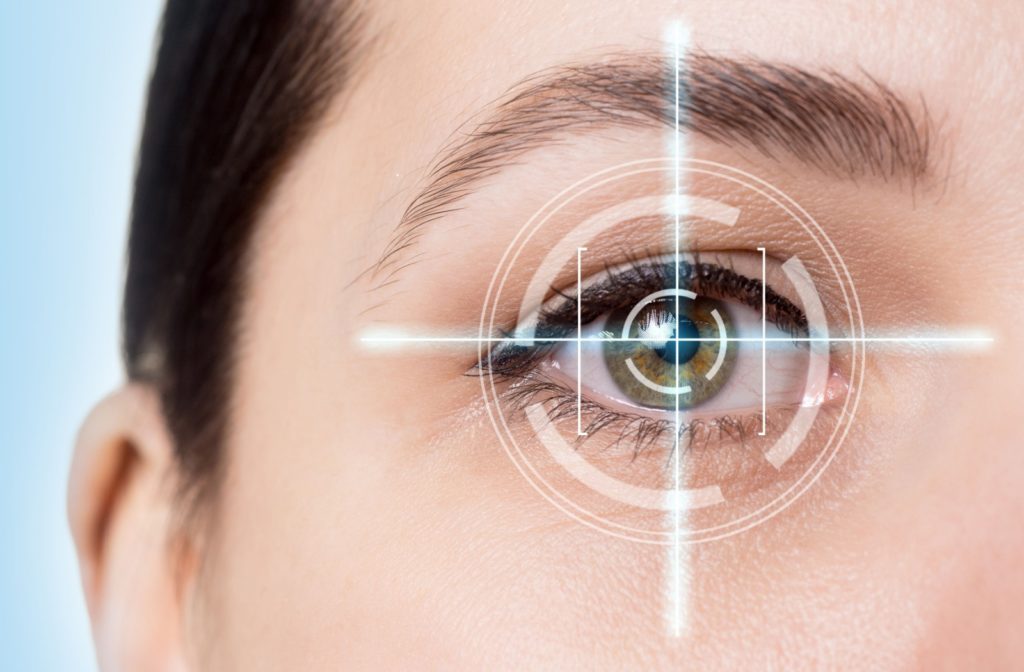At various points in your life, you’ve likely heard the phrase “20/20 vision” thrown around.
20/20 vision is often considered perfect vision, but 20/20 vision simply refers to average vision. In fact, “perfect” vision is usually an unfair standard because few people have it.
However, having good vision encompasses several aspects beyond how sharp your vision is. Eyeglasses, contact lenses, and refractive error treatments like laser eye surgery can support your vision to help maintain good vision.
What Does 20/20 Vision Mean?
“20/20” refers to normal visual acuity, or the clarity and sharpness of your vision, measured at a distance of 20 feet. If you have 20/20 vision, you can see clearly at 20 feet what a person with normal vision should see at 20 feet. It’s a standard used to gauge visual performance.
However, having 20/20 vision doesn’t necessarily mean your eyes are flawless. It merely indicates that you have average clarity and sharpness of vision.
What Else Matters in Vision?
While having 20/20 vision is a good indicator of visual clarity, it’s not the only factor that matters. Other aspects of vision contribute to your overall visual experience, including:
- Peripheral Vision: The ability to see objects outside your direct line of sight. Good peripheral vision is crucial for activities like driving, where you must know what’s happening around you.
- Depth Perception: This allows you to judge distances accurately and is essential for tasks like catching a ball or navigating stairs.
- Color Vision: The ability to distinguish between colors impacts various daily activities, from reading traffic lights to selecting ripe fruits.
- Contrast Sensitivity helps you distinguish objects against a similar background, such as when detecting a pedestrian crossing the road at night.
All these factors work together to create your visual experience. Neglecting any of them can impact your overall quality of life, making routine eye exams essential for a holistic approach to eye health.
Is 20/20 Vision Common?
It’s estimated that only about 35% of adults have 20/20 vision without corrective lenses. Children, in particular, may not have 20/20 vision as their eyes are still developing. Parents should schedule routine eye exams for their kids to detect and address any vision problems early on. Early intervention can significantly impact a child’s learning and overall development.
Various factors can influence visual acuity in adults, including age, lifestyle, and underlying health conditions. Conditions such as diabetes or high blood pressure can affect eyesight, underscoring the need for comprehensive eye care as part of an overall health regimen.
Can You Have Better Than 20/20 Vision?
Some people have 20/10 vision. They can clearly see things at 20 feet what people with average vision can only clearly see at 10 feet. This level of visual acuity is exceptional and rare, often attributed to genetic factors or specialized refractive error treatments like laser eye surgery.
Having vision better than 20/20 can offer advantages in various professions and activities. For example, athletes, pilots, and surgeons may benefit from heightened visual clarity. However, this level of vision isn’t necessary for everyday tasks and doesn’t imply that someone with 20/20 vision is at a disadvantage.
In fact, in California, the Department of Motor Vehicles (DMV) requires drivers to have 20/40 vision with both eyes together, or 20/40 in one eye and at 20/70 or better in the weaker eye. Whether or not drivers use corrective lenses, they must meet the DMV’s vision screening standard.
It’s also worth noting that having exceptionally sharp vision doesn’t guarantee overall eye health. Regular eye exams are still crucial for detecting other potential issues, such as glaucoma or macular degeneration, which can affect your vision differently.

What If My Vision Is Weaker than 20/20?
If your vision doesn’t meet the 20/20 standard, don’t worry. Various corrective measures can help you achieve a clear vision. The most common methods include eyeglasses and contact lenses. Both options have advanced significantly, offering a range of styles and functionalities to suit different needs.
Laser eye surgery, like LASIK, is also available for those looking for a more permanent solution. This procedure reshapes the cornea to correct refractive errors, providing long-term results.
Newer technologies like orthokeratology involve wearing specially designed contact lenses overnight to reshape the cornea temporarily. This method can provide clear vision during the day without needing glasses or contacts.
How Do I Check My Visual Acuity?
Checking your visual acuity is simpler than you think. Most eye exams include a Snellen chart test, which measures how well you can see at different distances. During this test, you’ll read lines of letters that get progressively smaller. The smallest line you can read accurately determines your visual acuity.
Self-assessment tools are also available online but should differ from professional eye exams. These tools can give you a general idea of your visual acuity but need more accuracy and the comprehensive nature of an optometrist’s evaluation.
How Can I Reduce My Risk of Having Less Than 20/20 Vision?
Maintaining healthy vision involves more than just regular eye exams. Lifestyle choices play a significant role in preserving your eyesight.
- Healthy Diet: Consuming foods rich in antioxidants, vitamins A and C, and omega-3 fatty acids can support eye health. Leafy greens, carrots, and fish are excellent choices.
- Protective Eyewear: Wearing sunglasses that block UV rays can protect your eyes from harmful sunlight. Safety goggles are necessary if you work in environments with potential eye hazards.
- Screen Time Management: Prolonged screen time can strain your eyes. Follow the 20-20-20 rule—every 20 minutes, take a 20-second break and look at something 20 feet away.
Incorporating these habits into your daily routine can reduce the risk of developing vision problems and maintain your eye health.
The Road to Enhanced Eye Health
Refractive error treatments, like glasses, contacts, and laser eye surgery, can help correct vision and provide better visual clarity. At Total Vision Chino Hills, we understand that people might strive for “perfect” vision, but perfection can be tricky to achieve and trickier to maintain.
By taking a holistic approach to all aspects of vision, we can monitor your eye health and visual acuity to help preserve your sight. With proper care, healthy vision is possible. Contact us today to schedule your next comprehensive eye exam.





